人教版高中英语必修五省略句专题
高二英语必修五Unit 5 section 4
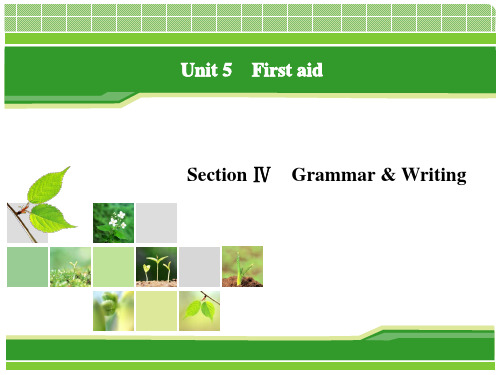
人教版英语 · 必修5
同步语法讲座
单元写作平台
2.表示条件、时间、地点、方式或让步等的状语从句的谓
语含有be动词,且从句的主语又和主句中的主语一致,或者主语
是it时,常把从句中的主语连同be动词一起省略。 If so(=If it is so),you must go back and get it. 如果是这样的话,你必须回去把它拿来。 Look out for cars when crossing the street
六、虚拟语气中的省略
1.虚拟条件句常省略if,而将were,had,should提前,构
成部分倒装。 Had you come here yesterday,you would have met her. =If you had come here yesterday,you would have met her. 如果你昨天来这儿的话,你就会见到她了。
The news made me angry,but(the news made)John happy.这
条消息使我生气,但却让约翰高兴。
人教版英语 · 必修5
同步语法讲座
单元写作平台
四、主从复合句中的省略
1.宾语从句中,连词that常省略,但当有多个并列宾语从 句时,只能省略第一个that。 I know(that)she is a teacher and that she is an excellent writer.我 知道她是一名教师,也是一位优秀的作家。
I have some trouble(in)learning English.
我学英语有困难。 What prevented him(from)going? 什么事阻止了他去?
人教版必修五unit5语法:省略句强化训练题
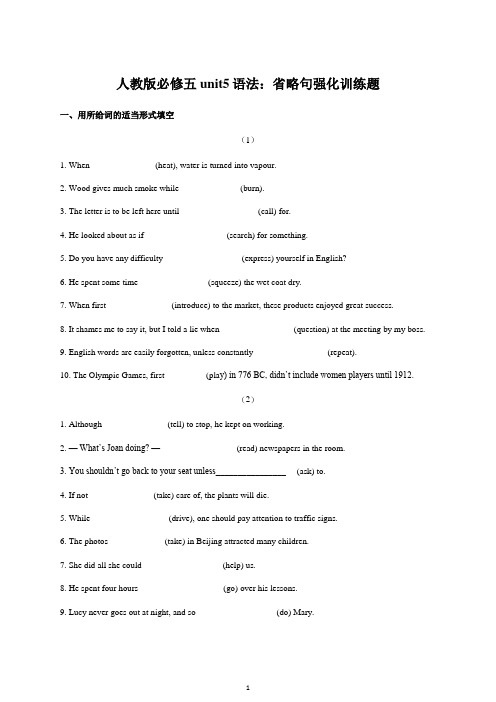
人教版必修五unit5语法:省略句强化训练题一、用所给词的适当形式填空(1)1. When ______________ (heat), water is turned into vapour.2. Wood gives much smoke while _____________ (burn).3. The letter is to be left here until _________________ (call) for.4. He looked about as if __________________ (search) for something.5. Do you have any difficulty _________________ (express) yourself in English?6. He spent some time _______________ (squeeze) the wet coat dry.7. When first ______________ (introduce) to the market, these products enjoyed great success.8. It shames me to say it, but I told a lie when ________________ (question) at the meeting by my boss.9. English words are easily forgotten, unless constantly ________________ (repeat).10. The Olympic Games, first _________(pla y) in 776 BC, didn’t include women players until 1912.(2)1. Although______________ (tell) to stop, he kept on working.2. —What’s Joan doing? —_________________ (read) newspapers in the room.3. You shouldn’t go back to your seat unless__________________ (ask) to.4. If not______________ (take) care of, the plants will die.5. While_________________ (drive), one should pay attention to traffic signs.6. The photos____________ (take) in Beijing attracted many children.7. She did all she could__________________ (help) us.8. He spent four hours___________________ (go) over his lessons.9. Lucy never goes out at night, and so__________________ (do) Mary.10. It is suggested that we___________________ (go) to see the film.二.句型转换(1)1. A: He is as tall as you are if he is not taller than you.B: He is as tall as you if __________ __________.2. A: You may ask him questions if you have any questions to ask.B: You may ask him questions ________ ________.3. A: Errors, if there are any, should be corrected.B: Errors, __________ __________, should be corrected.4. A: When I am in trouble, I always turn to her for help.B: When __________ __________, I always turn to her for help.5. A: While we were there, we were thinking of you all the time.B: __________ __________, we were thinking of you all the time.6. A: If it were not for dust, there would be no drops.B: __________ __________ for dust, there would be no drops.7. A: When it is necessary, you can help us to do something.B: __________ __________, you can help us to do something.8. A: He made up his mind to finish the experiment whether it was difficult or not.B: He made up his mind to finish the experiment _________ _________ _________ _________.9. A: Some books are to be tasted, while others are to be swallowed.B: Some books are to be tasted, while _________ _________ __________ __________.10. A: He works very hard though he is still rather weak.B: __________ __________ _________ _________, he works very hard.(2)1. She works hard. It is no wonder that she passed the exam.→She works hard. ________ ________ ________ ________ ________ ________.2.They haven’t completed the project,but they ought to have completed it.→They haven’t completed the project,but ________ ________ ________ ________.3.It is well done.→________ ________.4.If it is possible,you should try it again.→________ ________,you should try it again.5.If we had gone to the party,we would have known the fact.→________ ________ ________ ________ ________ ________,we would have known the fact.三.用省略结构完成句子(1)1.Some of you may have finished Unit 1.________ (如果是这样的话),you can go on to Unit 2. 2.—My mother is preparing my favorite dishes. Go with me and have a taste,okay?—________________(我愿意去).And I’ll be g lad to meet your parents.3.—Have you finished your first paper?—________(还没有).Just half of it.How about you?4.—Have you got any particular plans for the coming holiday?—Yes,________________(如果可能的话),I’m going to visit some homes for the old in the city. 5.—Would you like to join us in the game?—________________(恐怕不行),for I have something important to attend to.(2)1. The boy wanted to ride his bicycle in the street, but his mother ________ ________ ________ ________. 这个男孩想在街上骑自行车,可他妈妈不同意。
高中英语Unit5FirstaidSectionⅢGrammar_省略教案含解析新人教版必修5
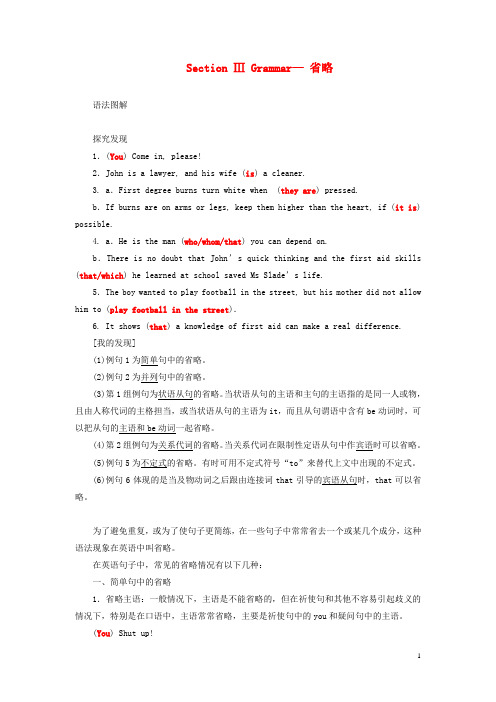
Section Ⅲ Grammar—省略语法图解探究发现1.(You) Come in, please!2.John is a lawyer, and his wife (is) a cleaner.3. a.First degree burns turn white when (they are)pressed.b.If burns are on arms or legs, keep them higher than the heart, if (it is) possible.4. a.He is the man(who/whom/that) you can depend on.b.There is no doubt that John’s quick thinking and the first aid skills (that/which) he learned at school saved Ms Slade’s life.5.The boy wanted to play football in the street, but his mother did not allow him to (play football in the street).6. It shows (that) a knowledge of first aid can make a real difference.[我的发现](1)例句1为简单句中的省略。
(2)例句2为并列句中的省略。
(3)第1组例句为状语从句的省略。
当状语从句的主语和主句的主语指的是同一人或物,且由人称代词的主格担当,或当状语从句的主语为it,而且从句谓语中含有be动词时,可以把从句的主语和be动词一起省略。
(4)第2组例句为关系代词的省略。
当关系代词在限制性定语从句中作宾语时可以省略。
(5)例句5为不定式的省略。
有时可用不定式符号“to”来替代上文中出现的不定式。
人教版英语必修五语法省略句
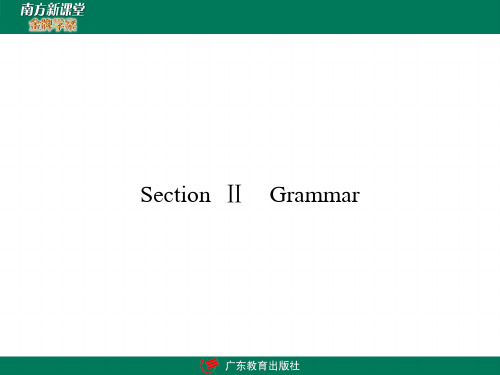
语法指南
②当用I’m afraid,I think,I believe,I hope,I guess等做答句时,后面常用省略形式。 —Do you think it will rain?你认为会下雨吗? —I guess so.我猜会。 I hope so.我希望这样。 I hope not.我希望不会。 I’m afraid so/not.恐怕如此/不如此。 I think/believe/expect/suppose so. 我认为/相信/希望/料想是这样。 ③在宾语从句中常省略连词that,但当及物动词之后跟两个或两个以上的宾语 从句时,只有第一个连词that可省略。 He told me (that) she was a beautiful girl and that she was clever. 他告诉我她是一个漂亮的女孩,而且很聪明。
语法指南
②如果做宾语的不定式是be动词或完成时态,则须在to之后加上be或have。 —Are you a doctor?——你是医生吗? —No,but I want to be.——不,但我希望是。 —He hasn’t finished his homework.——他没有完成作业。 —He ought to have.——他本应该完成的。 ③两个或两个以上的不定式并列,第一个带to,后面的常可省略to。 My job is to look after the children and teach them English. 我的任务是照顾孩子并教他们英语。 但如果两个不定式表示对比关系时,则to都不能省略。 To be for the plan or to be against it doesn’t matter. 赞成或反对这项计划都不要紧。
语法指南
Unit5 语法省略句趣味讲解课件 高二上学期英语人教新课标必修五

1、宾语从句中常省略引导词that
I believe (that) he is an honest man. 2、在限制性定语从句中,关系代词 who/whom/which/that在从句中作宾语时可省略. Do you know the man (that) they are talking about?
四.并列句中的省略
两个并列句中,后一个分句常省略与前一分句中 相同的部分。 (1) My father is a doctor and my mother (is) a nurse.
(2) I study at college and my sister (studies) at high school.
(4) 某些使役动词(let, make, have)及感官动词 (see, watch, hear, notice, observe, feel, look at, listen to等)后加省 to的不定式, 但在被动语态 中须将to复原。 I saw the boy fall off the tree. The boy was seen to fall off the tree. The boss made us work 12 hours a day. We were made to work 12 hours a day.
A. Mr. Smith has just been fishing and caught some small fish. B. Mr. Green caught some big fish and wanted to give some to
Mr. Smith. C. Mr. Smith didn't catch any small fish. D. Mr. Smith wanted to buy some big fish from Mr. Green.
人教版高中英语必修五语法专题复习_省略句

四“看”: watch notice observe see
虚拟条件句中的省略
在以if引导的非真实条件句中若含有 were,had,should时,常可以省略if而将 were,had,should置于句首。
IfIwereyou,I’dgivetheAIDSpatientahug. WereIyou,I’dgivetheAIDSpatientahug.
3)Toherteacher’ssurprise,shedid betterinherfirstaidexamthan expected. Toherteacher’ssurprise,shedid betterinherfirstaidexamthan(shewas)e xpected(todo).
5)Hewantedtohelptheaccidentvictimbuthis frienddidn’t. Hewantedtohelptheaccidentvictimbuth isfrienddidn’t(wanttohelptheaccidentv ictim).
6)Youcanborrowmyfirstaidnotesifyou wantto. Youcanborrowmyfirstaidnotesifyouwan tto(borrowmyfirstaidnotes).
sedto.
(givemethechance).
–Areyouanengineer?–No,butIwantto.
be
–Hehasn’tfinishedthetaskyet.
–Well,heoughtto. have
Attention!
使役动词及感官动词后面作宾语补足语的不定 式一定要省去to,但在被动语态中须将to复原 。
高中英语 省略句用法及高考题课件 新人教必修5

主语
谓语或谓语的 一部分
宾语
主语 和谓语
(1) A:Would you like to come to the party? 不定式后
(2) B: I’d love to (come the party.)
省略动词
1. 不定式省略,单独使用不定式符号to
1). 代替动词不定式后被省略的动词,常在
be afraid, expect, forget, hope, intend, like,
9. He may not be at home then. If so, leave him a note.
If he is not at home…
10. Get up early tomorrow. If not, you will miss the first bus.
If you don’t get up early…
2 In groups, look at these pairs of sentences(page 37)
Discuss 1) the difference between A and B in each pair, 2) Which sentence is better, 3) Why it is better.
为了使语言简洁或避免重复,省略句中的一个或几个句子成 分,这种语法现象乘为省略。
18-19 高中英语人教版必修5Unit 5 Section Ⅲ Grammar——省略
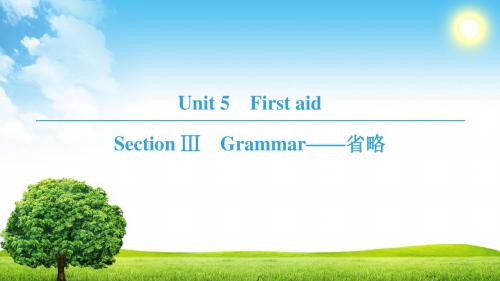
语 法 精 要 点 拨
year. 一旦出版,那本小说会成为年度畅销书之一。 Although (he was) hardworking, he couldn't earn enough to support himself. 尽管努力工作,他的收入还是不够自己糊口。
返 首 页
语 境 自 主 领 悟
返 首 页
语 法 精 要 点 拨
if (it is) possible. 3.It shows (that) a knowledge of first aid can make a real difference. 4.First degree burns turn white when (they are) pressed.
返 首 页
语 境 自 主 领 悟
2.省略共同的主语和谓语动词 His performance made us amused, but (his performance made) himself tired. 他的表演使我们高兴,但是使他自己很累。 3.省略共同的助动词、情态动词等
语 法 应 用 落 实
返 首 页
语 法 精 要 点 拨
语 法 应 用 落 实
语 境 自 主 领 悟
We insisted that they (should) go with us. 我们坚决要求他们和我们一起走。 It is necessary that we (should) learn more words by heart. 我们有必要多用心记一些单词。
Unit 5 First aid
Section Ⅲ
Grammar——省略
[语 境 自 主 领 悟]
人教新课标必修五 Unit 5 First Aid-Grammar省略[课件]
![人教新课标必修五 Unit 5 First Aid-Grammar省略[课件]](https://img.taocdn.com/s3/m/9606c522af45b307e8719777.png)
• 高考链接: • 1. When first ________ to the B market, these products enjoyed great success. • A. introducing B. introduced C. introduce D. being introduced • 2. Unless ________ to speak, you A should remain silent at the conference. A. invited B. inviting C. being invited D. having invited
பைடு நூலகம்
4.表示讲话人的意见和 4.表示讲话人的意见和看法 表示讲话人的意见
(It) sounds fine to me. (It’s a) pity you couldn’t come.
5.提问 5.提问
(Is there) anything wrong? (Have you) found the bike?
惯用的省略结构
1.无动词祈使句,无主句祝愿句, 1.无动词祈使句,无主句祝愿句,这类句子 无动词祈使句 往往用感叹号. 往往用感叹号.
If only I could remember his name!
2.固定句型How/What about + n/pron/-ing. n/pron/2.固定句型How/What 固定句型
• 一、 在含有状语从句的复合句中
• when,while, once, 由when,while,as, once,whenever 引导的时间状语从句;或由if unless引导 if, 引导的时间状语从句;或由if,unless引导 的条件状语从句; though,although, 的条件状语从句;由though,although, though引导的让步状语从 even if ,even though引导的让步状语从 though, if,as引导的方式状 句;由as though,as if,as引导的方式状 语从句; wherever引导的地点状语从句 引导的地点状语从句, 语从句;由wherever引导的地点状语从句, 若从句的主句是it或与主句的主语相同, it或与主句的主语相同 若从句的主句是it或与主句的主语相同,且 在谓语中含有be be时 常省略从句的主语和be be。 在谓语中含有be时,常省略从句的主语和be。
人教版必修五unit5firstaidgrammar省略课件

He said (that) the text was very
important and that we should learn it by
heart.
4. 由which, when, where, how 和why引导的宾语从句,可 全部或部分省略。
He XXX come back, but he doesn't know when ( he XXX come back).
3. 在know, think, consider, suppose, find, believe, say, decide等动词后面所接 的宾语从句中,连词that可以省略;若 带有多个宾语从句,只有第一个that可 省略,其余的则不能。
I think (that) it XXX clear up(转晴
It is easier to make a plan than to carry it out.(平行结构)
※4. 在see, watch, notice, hear, listen to,
look at, feel, have make, let, observe等 词后作宾语补足语时,省略不定式符号 to;Why (not) do结构中不定式不带to.
go to see the film.
四、复合句中特殊的省略现象 。 1. 主句省略多用于句首,在答 句中,主句或者一些成分可全 部省略。
(It is a) Pity that I didn't go
to Mary's birthday party
yesterday.
※2. 省略一个从句或从句的一部 分,可用so或not代替。
人教版高中英语必修五高二英语复习:省略语法专练.docx
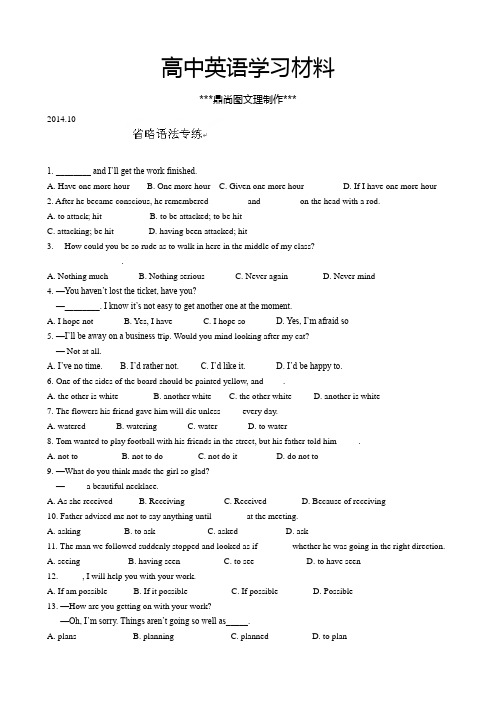
高中英语学习材料***鼎尚图文理制作***2014.101. ________ and I’ll get the work finished.A. Have one more hourB. One more hourC. Given one more hourD. If I have one more hour2. After he became conscious, he remembered ________ and ________ on the head with a rod.A. to attack; hitB. to be attacked; to be hitC. attacking; be hitD. having been attacked; hit3. ---How could you be so rude as to walk in here in the middle of my class?---_____________.A. Nothing muchB. Nothing seriousC. Never againD. Never mind4. —You haven’t lost the ticket, have you?—________. I know it’s not easy to get another one at the moment.A. I hope notB. Yes, I haveC. I hope soD. Yes, I’m afraid so5. —I’ll be away on a business tr ip. Would you mind looking after my cat?— Not at all. ____________A. I’ve no time.B. I’d rather not.C. I’d like it.D. I’d be happy to.6. One of the sides of the board should be painted yellow, and ____.A. the other is whiteB. another whiteC. the other whiteD. another is white7. The flowers his friend gave him will die unless ____ every day.A. wateredB. wateringC. waterD. to water8. Tom wanted to play football with his friends in the street, but his father told him_____.A. not toB. not to doC. not do itD. do not to9. —What do you think made the girl so glad?—_____a beautiful necklace.A. As she receivedB. ReceivingC. ReceivedD. Because of receiving10. Father advised me not to say anything until _______ at the meeting.A. askingB. to askC. askedD. ask11. The man we followed suddenly stopped and looked as if _______ whether he was going in the right direction.A. seeingB. having seenC. to seeD. to have seen12. _____, I will help you with your work.A. If am possibleB. If it possibleC. If possibleD. Possible13. —How are you getting on with your work?—Oh, I’m sorry. Things aren’t going so well as_____.A. plansB. planningC. plannedD. to plan14. —Are you a volunteer now?—No, but I _____. I worked for the City Sports Meeting last year.A. used toB. used to beC. used to doD. was used to15. —Are you a teacher?—No, but I _____. I worked in a middle school for three years.A. amB. willC. doD. was16. —How many poor counties will there be in our province by next year?—There will be only a few, if _____.A. muchB. someC. anyD. many17. Doctors have said that as many as 50% of patients don’t take medicine ________.A. like directedB. to be directedC. as directedD. so that directed18. —He hasn’t gone to the office up to now.—Well, he_______.A. shouldB. ought toC. ought to goD. ought to have19. —Be sure to get up earlier tomorrow morning.—_______, I’ll be as early as a bird.A. OK, I willB. I’m afraid I canC. Of course notD. No, I will20. He said _____ his sister had passed the college entrance examination, and _____ she would go to college inabout 20 days.A. that; 不填B. that; thatC. 不填; 不填D. that; which21. —You must obey every word of mine.—_______ I don’t?A. How ifB. What ifC. Such asD. Only if22. —You should have thanked her before you left.—I meant ______, but when I was leaving I couldn’t find her anywhere.A. to thankB. toC. /D. thanking23. ---I hope the children won’t touch the dog.----I’ve warned them ____.A. notB. not toC. not touchD. not do24. The workers did all ______ good care of the old man.A. they could to takeB. they could takeC. which they could to takeD. what they could to take25. — You seem to have lost your way. _____? —I’m looking for Wangfujing Street.A. What forB. Need helpC. Why soD. Where to。
人教版英语必修五语法_省略句_1课件

I. 简单句中的省略 1.在口语中 -- How is your mother today?
-- (She is ) Much better.
(Is there) Anything wrong?
• —What do you think made Mary so upset? • —________ her bicycle. • A. As she lost B. Lost • C. Losing D. Because of losing • Losing her bicycle made Mary so upset
1.如果状语从句的主语与主句的主语一致,并且从句的谓 语部分有be动词,则可以将从语中的主语及be动词一 起省略。
When he was asked what he had done, John just kept silent. When he was asked what he had done, John just kept silent. If he is free, Jack will go with us. If he is free, Jack will go with us.
Unless he is invited, he won’t come.
Unless he is invited, he won’t come. While he is doing house work, my he father often listens to music. While he is doing house work, my father often listens to music.
省略作宾语的不定式短语,只保留to,但如 果不定式to后是be或完成时态,则须保留be 或have:
高二英语人教版必修五讲义Unit5SectionⅢGrammar省略句

[语法初识]原句感知自主探究1.①First degree burns turn white when (theyare) pressed.②If burns are on arms or legs, keep them higher than the heart, if (it is) possible.2.①He is the man (who/whom/that) you can depend on.②There is no doubt that John's quick thinking and the first aid skills (that/which) he learned at school saved Ms Slade's life.3.The boy wanted to play football in the street, but his mother did not allow him to (play football in the street).4.It shows (that) a knowledge of first aid can make a real difference. (1)第1组例句为状语从句的省略。
当状语从句的主语和主句的主语指的是同一人或物,且由人称代词的主格担当,或当状语从句的主语为it,而且从句谓语中含有be动词时,可以把从句的主语和be动词一起省略。
(2)第2组例句为关系代词的省略。
当关系代词在限制性定语从句中作宾语时可以省略。
(3)例句3为不定式的省略。
有时可用不定式符号“to”来替代上文中出现的不定式。
(4)例句4为当及物动词之后跟由连接词that 引导的宾语从句时,that可以省略。
[语法剖析]为了避免重复,或为了使句子更简练,在一些句子中常常省去一个或某几个成分,这种语法现象在英语中叫省略。
在英语句子中,常见的省略情况有以下几种:语法点一状语从句中的省略1.在从句中,常省略跟主句相同的主语和系动词be或当从句的主语为it时,则从句中主语和be 动词常被省略。
高中英语人教版五Unit5FirstaidGrammar:省略
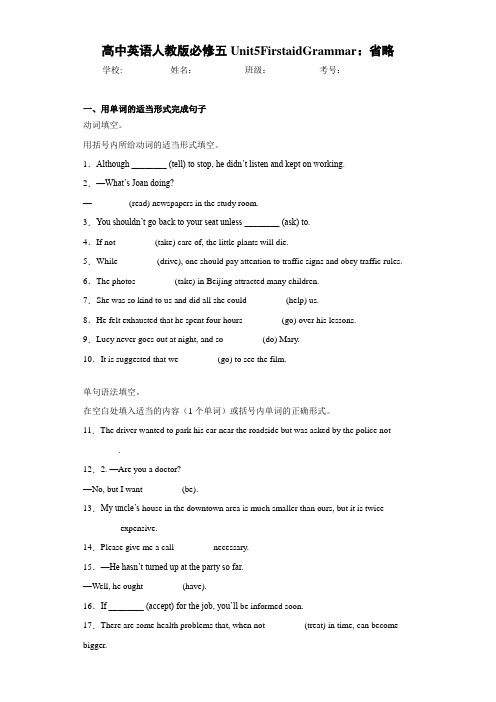
高中英语人教版必修五Unit5FirstaidGrammar:省略学校:___________姓名:___________班级:___________考号:___________一、用单词的适当形式完成句子动词填空。
用括号内所给动词的适当形式填空。
1.Although ________ (tell) to stop, he didn’t listen and kept on working.2.—What’s Joan doing?—________ (read) newspapers in the study room.3.You shouldn’t go back to your seat unless ________ (ask) to.4.If not ________ (take) care of, the little plants will die.5.While ________ (drive), one should pay attention to traffic signs and obey traffic rules. 6.The photos ________ (take) in Beijing attracted many children.7.She was so kind to us and did all she could ________ (help) us.8.He felt exhausted that he spent four hours ________ (go) over his lessons.9.Lucy never goes out at night, and so ________ (do) Mary.10.It is suggested that we ________ (go) to see the film.单句语法填空。
在空白处填入适当的内容(1个单词)或括号内单词的正确形式。
人教新课标必修五省略句语法练习
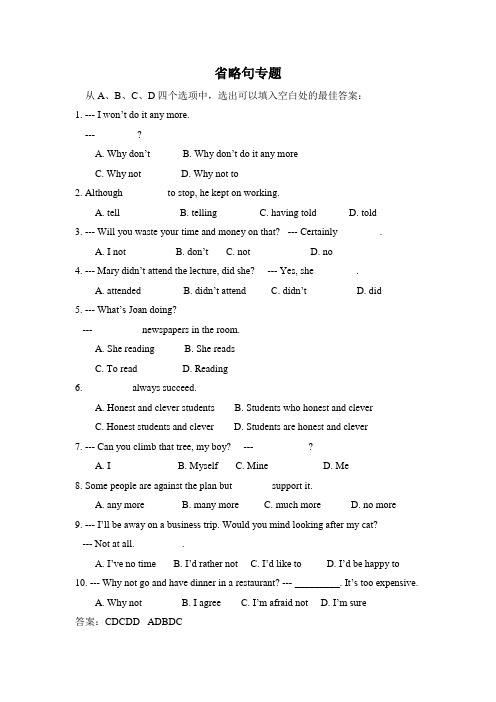
省略句专题从A、B、C、D四个选项中,选出可以填入空白处的最佳答案:1. --- I won’t do it any more.--- ________?A. Why don’tB. Why don’t do it any moreC. Why notD. Why not to2. Although ________ to stop, he kept on working.A. tellB. tellingC. having toldD. told3. --- Will you waste your time and money on that? --- Certainly ________.A. I notB. don’tC. notD. no4. --- Mary didn’t attend the lecture, did she? --- Yes, she ________.A. attendedB. didn’t attendC. didn’tD. did5. --- What’s Joan doing?--- _________ newspapers in the room.A. She readingB. She readsC. To readD. Reading6. _________ always succeed.A. Honest and clever studentsB. Students who honest and cleverC. Honest students and cleverD. Students are honest and clever7. --- Can you climb that tree, my boy? --- __________ ?A. IB. MyselfC. MineD. Me8. Some people are against the plan but _______ support it.A. any moreB. many moreC. much moreD. no more9. --- I’ll be away on a business trip. Would you mind looking after my cat?--- Not at all. _________.A. I’ve no timeB. I’d rather notC. I’d like toD. I’d be happy to10. --- Why not go and have dinner in a restaurant? --- _________. It’s too expensive.A. Why notB. I agreeC. I’m afraid notD. I’m sure答案:CDCDD ADBDC。
人教版高中英语必修五book5unit5grammar

ATTENTION !
使役动词及感官动词后面作宾语补足语的不 定式一定要省去to,但在被动语态中须将to复 原。
I noticed a manXto enter the classroom when I passed by.
A man was noticed ttoo enter the classroom.
2. What surprised me was not what he said but _A__ he said it. A. the way B. in the way that C. in the way D. the way which
3. A computer does only what thinking people ___A___. A. have it do B. have it done C. have done it D. having it done
4. -- I’ll be away on a business trip. Would you mind looking after my car?
-- Not at all. _D___. A. I’ve no time B. I’d rather not C. I’d like it D. I’d be happy to
If he is free, Jack will go with us.
四 不定式中的省略
动词不定式中为了避免重复,省去与前面出现的相同 部分,只保留to,但如果在省略的不定式结构中含有 be,have, have been时,要保留这些词。
–Are you going there? –Yes, I’d like to . (go there).
人教版高中英语必修五省略句专题
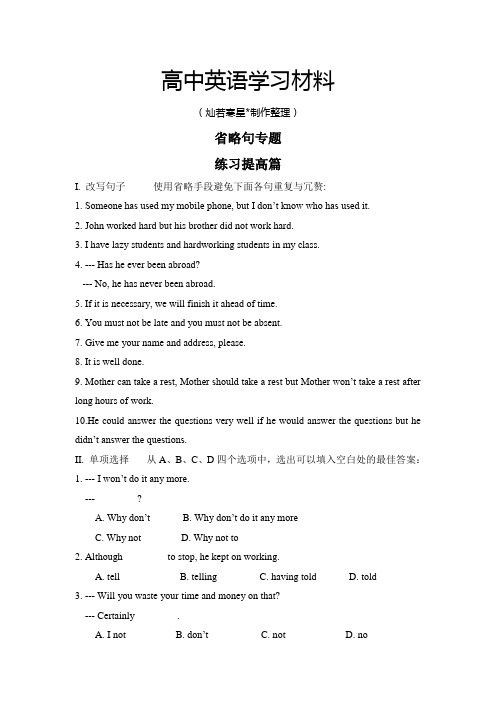
高中英语学习材料(灿若寒星*制作整理)省略句专题练习提高篇I. 改写句子使用省略手段避免下面各句重复与冗赘:1. Someone has used my mobile phone, but I don’t know who has used it.2. John worked hard but his brother did not work hard.3. I have lazy students and hardworking students in my class.4. --- Has he ever been abroad?--- No, he has never been abroad.5. If it is necessary, we will finish it ahead of time.6. You must not be late and you must not be absent.7. Give me your name and address, please.8. It is well done.9. Mother c an take a rest, Mother should take a rest but Mother won’t take a rest after long hours of work.10.He could answer the questions very well if he would answer the questions but he didn’t answer the questions.II. 单项选择从A、B、C、D四个选项中,选出可以填入空白处的最佳答案:1. --- I won’t do it any more.--- ________?A. Why don’tB. Why don’t do it any moreC. Why notD. Why not to2. Although ________ to stop, he kept on working.A. tellB. tellingC. having toldD. told3. --- Will you waste your time and money on that?--- Certainly ________.A. I notB. don’tC. notD. no4. --- Mary didn’t attend the lecture, did she?--- Yes, she ________.A. attendedB. didn’t attendC. didn’tD. did5. --- What’s Joan doing?--- _________ newspapers in the room.A. She readingB. She readsC. To readD. Reading6. _________ always succeed.A. Honest and clever studentsB. Students who honest and cleverC. Honest students and cleverD. Students are honest and clever7. --- Can you climb that tree, my boy? --- __________ ?A. IB. MyselfC. MineD. Me8. Some people are against the plan but _______ support it.A. any moreB. many moreC. much moreD. no more9. --- I’ll be away on a business trip. Would you mind looking after my cat?--- Not at all. _________.A. I’ve no timeB. I’d rather notC. I’d like toD. I’d be happy to10. --- Why not go and have dinner in a restaurant? --- _________. It’s too expensive.A. Why notB. I agreeC. I’m afraid notD. I’m sure答案:CDCDD ADBDC。
- 1、下载文档前请自行甄别文档内容的完整性,平台不提供额外的编辑、内容补充、找答案等附加服务。
- 2、"仅部分预览"的文档,不可在线预览部分如存在完整性等问题,可反馈申请退款(可完整预览的文档不适用该条件!)。
- 3、如文档侵犯您的权益,请联系客服反馈,我们会尽快为您处理(人工客服工作时间:9:00-18:30)。
高中英语学习材料
madeofjingetieji
省略句专题
练习提高篇
I. 改写句子使用省略手段避免下面各句重复与冗赘:
1. Someone has used my mobile phone, but I don’t know who has used it.
2. John worked hard but his brother did not work hard.
3. I have lazy students and hardworking students in my class.
4. --- Has he ever been abroad?
--- No, he has never been abroad.
5. If it is necessary, we will finish it ahead of time.
6. You must not be late and you must not be absent.
7. Give me your name and address, please.
8. It is well done.
9. Mother c an take a rest, Mother should take a rest but Mother won’t take a rest after long hours of work.
10.He could answer the questions very well if he would answer the questions but he didn’t answer the questions.
II. 单项选择从A、B、C、D四个选项中,选出可以填入空白处的最佳答案:1. --- I won’t do it any more.
--- ________?
A. Why don’t
B. Why don’t do it any more
C. Why not
D. Why not to
2. Although ________ to stop, he kept on working.
A. tell
B. telling
C. having told
D. told
3. --- Will you waste your time and money on that?
--- Certainly ________.
A. I not
B. don’t
C. not
D. no
4. --- Mary didn’t attend the lecture, did she?
--- Yes, she ________.
A. attended
B. didn’t attend
C. didn’t
D. did
5. --- What’s Joan doing?
--- _________ newspapers in the room.
A. She reading
B. She reads
C. To read
D. Reading
6. _________ always succeed.
A. Honest and clever students
B. Students who honest and clever
C. Honest students and clever
D. Students are honest and clever
7. --- Can you climb that tree, my boy? --- __________ ?
A. I
B. Myself
C. Mine
D. Me
8. Some people are against the plan but _______ support it.
A. any more
B. many more
C. much more
D. no more
9. --- I’ll be away on a business trip. Would you mind looking after my cat?
--- Not at all. _________.
A. I’ve no time
B. I’d rather not
C. I’d like to
D. I’d be happy to
10. --- Why not go and have dinner in a restaurant? --- _________. It’s too expensive.
A. Why not
B. I agree
C. I’m afraid not
D. I’m sure
答案:
CDCDD ADBDC。
